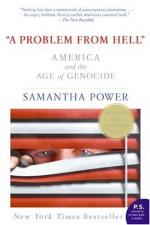
|
| Name: _________________________ | Period: ___________________ |
This test consists of 15 multiple choice questions and 5 short answer questions.
Multiple Choice Questions
1. Lemkin realizes that for a genocide convention to be passed and ratified, he needs to appeal to the _____________ of the delegates.
(a) Domestic political interests.
(b) Pocketbooks.
(c) Foreign political interests.
(d) Intellect and emotions.
2. Some who are opposed to the United States' ratification of the genocide treaty think it would be used to target the United States for its treatment of __________________.
(a) Native Americans and Japanese Americans.
(b) Native Americans.
(c) African Americans and Japanese Americans.
(d) Native Americans and African Americans.
3. As the resolution is discussed, some delegates advocate the use of ____________ instead of "genocide."
(a) Extermination.
(b) Persecution.
(c) Terrorism.
(d) Racism.
4. In what city is Szmul Zygielbojm, the man who releases a report prepared by an underground Jewish society in Poland that detailed the tactics Nazis were using to kill the Jews, located?
(a) Berlin.
(b) Amsterdam.
(c) London.
(d) Warsaw.
5. Some who are opposed to the United States' ratification of the genocide treaty think it is too broad and therefore can't be used to target what country?
(a) Iraq.
(b) The Soviet Union.
(c) China.
(d) North Korea.
6. Lemkin decides to lobby to what international body to adopt a resolution on genocide?
(a) The Allies' international military tribunal.
(b) The UN General Assembly.
(c) The League of Nations.
(d) The National Atlantic Treaty Organization.
7. Ultimately, Lemkin's fight is for an international law on ________________.
(a) Legal standards.
(b) Financial standards.
(c) Genocide.
(d) War crimes.
8. The Allies have ____________ intelligence on Hitler's extermination of European Jews.
(a) Some.
(b) Zero.
(c) Very little.
(d) A great deal of.
9. America officially ________, and Turkey officially _____________, the Armenian genocide. This stance is true with both countries to this day.
(a) Denies, denies.
(b) Ignores, denies.
(c) Acknowledges, denies.
(d) Ignores, acknowledges.
10. What is the name of the Polish diplomat and Roman Catholic who infiltrates first the Warsaw ghetto and later a death camp in order to report on Jewish suffering?
(a) Jan Karski.
(b) Karol Wojtyla.
(c) Szmul Zygielbojm.
(d) Lech Walesa.
11. Lemkin had read many of the histories detailing what crime?
(a) Rape.
(b) Treason.
(c) Mass suicide.
(d) Mass slaughter.
12. On what date does the Allied government condemn Turkey's action against the Armenians?
(a) May 15, 1919.
(b) May 24, 1915.
(c) May 19, 1915.
(d) May 15, 1924.
13. What is not yet invented at the time the Armenian genocide takes places and is therefore not available as a means by which to communicate news and information about it?
(a) Television.
(b) Photography.
(c) Telegraph.
(d) Newspapers.
14. On what date does Raphael Lemkin die?
(a) April 1, 1984.
(b) April 28, 1950.
(c) August 28, 1959.
(d) August 29, 1958.
15. When the United States sets up the Committee on Armenian Atrocities, what does the group not call for on behalf of the Armenians?
(a) Diplomatic intervention.
(b) Public awareness.
(c) Military intervention.
(d) Financial relief.
Short Answer Questions
1. What city does the Khmer Rouge seize in 1975 after a five-year civil war and defeat of the incumbent, American-backed government?
2. Western journalists, including _______________, still in the country describe Khmer Rouge brutality and report accounts from refugees.
3. Serbian forces executed over 7,000 Muslims in a _____________.
4. Who coins the word "genocide" to describe the atrocities in Nazi Germany and in Turkey?
5. Lemkin believes that both the ___________ and _________ existence of groups needs to be preserved.
|
This section contains 507 words (approx. 2 pages at 300 words per page) |

|




